Curriculum
Intent of Our Curriculum
Rutlish School provides a meaningful, broad and balanced curriculum which is accessible to all, as well as supports and challenges all students. Through all we do, we prepare students for opportunities, responsibilities and experiences later in life for them to be aware of their responsibilities and feel confident to participate and contribute to society. We aim to inspire, enable and facilitate lifelong learners that build on their individual strengths and capabilities and achieve their ambitions. We seek to support our students in becoming healthy, happy, successful modern young adults, who are knowledgeable, kind, aware, confident, capable and skilful members of society.
The school aims to:
- ensure that the curriculum is designed for every student of every ability and every background to be supported in making the best possible progress and attainment from their starting point; all students can access the curriculum offer, with planning and teaching that support, stretch and challenge all learners across a full range of abilities, and making any reasonable adjustments required where particular needs are identified;
- provide a curriculum that is sequenced to build skills and knowledge throughout students’ time at Rutlish School, to promote a deeper understanding of the world outside the classroom and equip them for their next steps in education, careers and in life;
- ensure that our curriculum offer support different educational and career pathways, including EBACC and vocational;
- ensure our curriculum provides opportunity to promote personal and character development, high moral standards, integrity, British Values, social, spiritual, cultural and self-awareness and allows students to formulate opinions on social issues such as, equality, diversity and inclusivity as well as the practical aspects of society.;
- enrich the curriculum and provide opportunities for students to build cultural capital, enhance a wide range of skills and knowledge beyond requirements of the national curriculum, and personalise and apply learning in other contexts;
- provide students with the skills and knowledge necessary to becoming independent, analytical, critical, and innovative thinkers and encourage students’ curiosity, creativity, self-expression, resilience, and confidence;
- provide consistent opportunities for students to develop and enhance their reading skills, and support is provided to ensure all students are able to access the curriculum.
We build upon this through our sixth form offer shared with the local school Ricards Lodge.
Please see more in the RR6 pages on our website: RR6
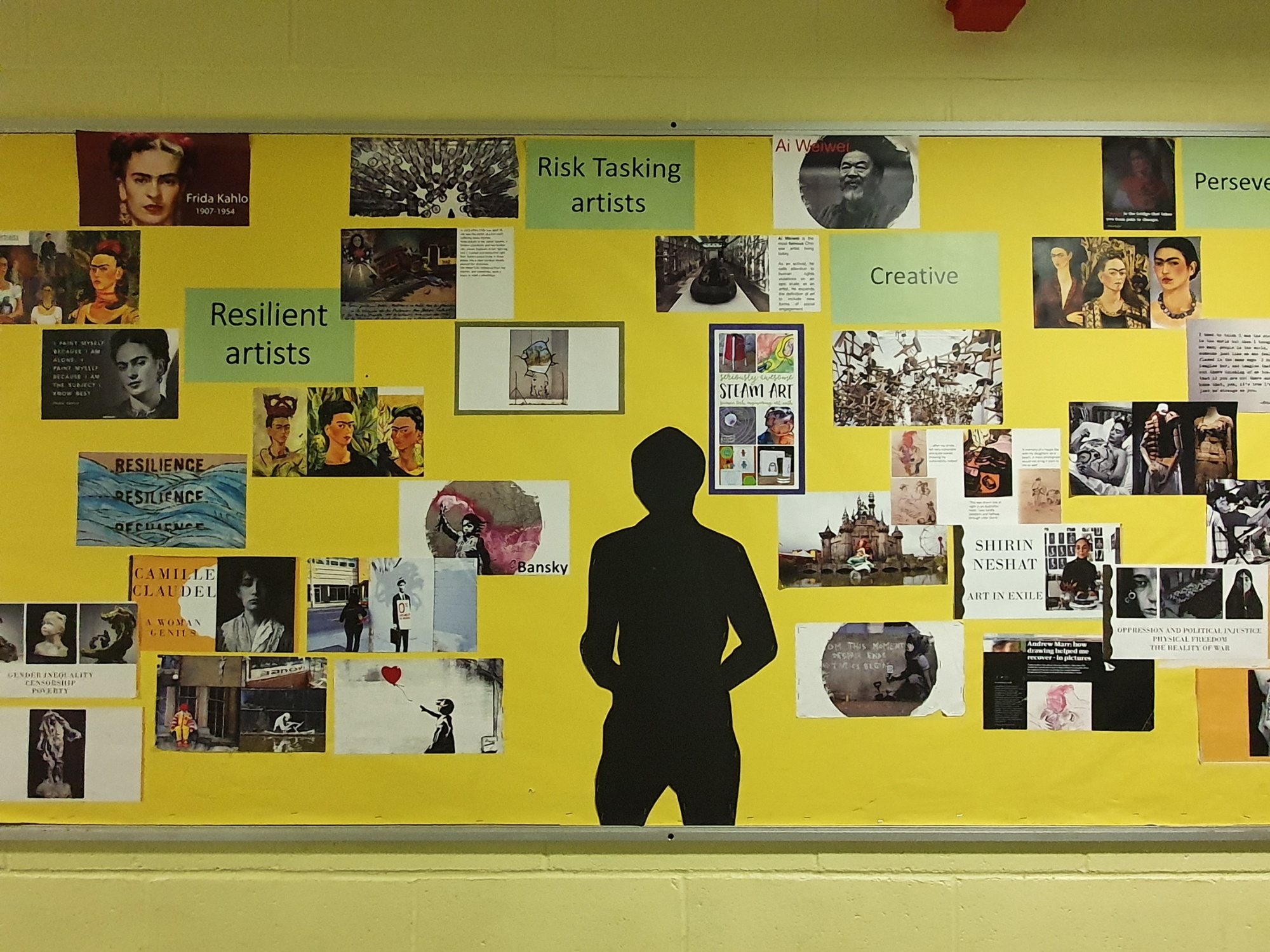
Curriculum Implementation: What We Teach
We ensure all students acquire the knowledge, skill and cultural capital available through studying in depth and breadth, the national curriculum from Year 7 to Year 11. This is taught by subject specialists from Year 7.
During Year 7 students are set in English, Mathematics, Science and MFL. All other subjects are taught in mixed ability classes until KS4 when RE is also set.
In KS3, KS4 and KS5 PSHE and RSE programmes are built around national best practice promoting the spiritual, moral, cultural, mental and physical development of students. These are taught both in stand-alone lessons and across the curriculum.
To achieve maximum flexibility, we organise our timetable as 50 taught periods over two weeks. In Years 7 and 8 the focus is a smooth transition from KS2 whilst building the foundations required to thrive in a high achieving school.
From Year 7 a comprehensive careers programme starts designed to inform students about approved technical education qualifications and apprenticeships. In addition, we are striving to achieve the employer encounters benchmark. To achieve this, we aim to offer every young person seven encounters with employers – at least one each year from Year 7 to Year 13. During Year 9, whilst continuing the full breadth of the KS3 National Curriculum students are supported to choose their KS4 options and individual departments begin to add more academic rigour and examination focus in preparation for KS4 study.
In selecting options in Year 9 students are strongly encouraged to maintain the depth and balance provided through an EBacc combination of subjects.
In Years 7, 8 and 9 the following subjects are taught fortnightly for the number of periods shown.
| Subject | Year 7 & 8 | Year 9 |
|---|---|---|
| English | 7 | 7 |
| Maths | 7 | 7 |
| Science | 6 | 6 |
| MFL | 5 | 4 |
| PE | 4 | 3 |
| Geography | 3 | 4 |
| History | 3 | 4 |
| RE | 3 | 3 |
| DT | 3 | 3 |
| ICT | 2 | 2 |
| Music | 2 | 2 |
| Drama | 2 | 2 |
| Art | 2 | 2 |
| PSHE & RSE | 1 | 1 |
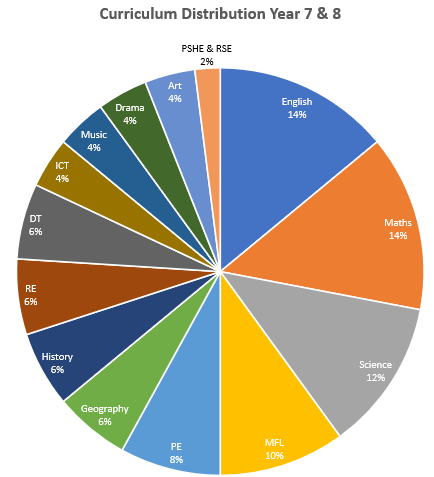
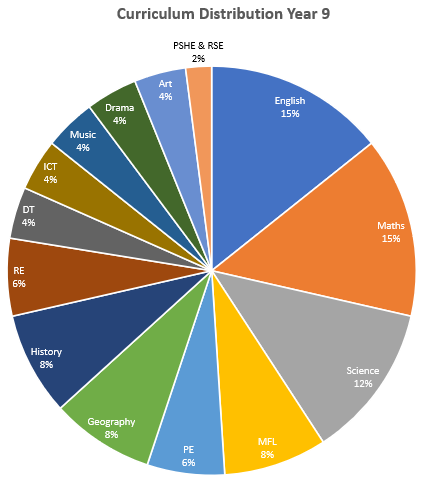
From Years 10 and 11 students follow a compulsory core of GCSE courses in English Language and Literature, Mathematics, 2 or 3 Sciences and RE. Four further choices are made from a wide range of national curriculum GCSE subjects. BTEC courses are offered and a few specialist GCSE courses such as Economics are also available.
During KS4 through targeted support and the careers programme we ensure a smooth transition to KS5 study or apprenticeship.
The options available to students in KS4 are:
| GCSE |
|---|
| Art |
| Computer Science |
| Drama |
| DT |
| Economics |
| French |
| Geography |
| German |
| History |
| Media Studies |
| Music |
| PE |
| Spanish |
| BTEC |
|---|
| Business Studies |
| iMedia |
| Media Studies |
| Performing Arts |
| Sport |
| Pupil Support Options |
|---|
| ESOL |
| Study Support |
In Years 10 and 11 the following subjects are taught fortnightly for the number of periods shown.
| Subject | Year 10 | Year 11 |
|---|---|---|
| English | 7 | 7 |
| Maths | 7 | 7 |
| Science | 9 | 9 |
| Core PE | 2 | 2 |
| RE | 4 | 4 |
| PSHE | 1 | 1 |
| Option 1 | 5 | 5 |
| Option 2 | 5 | 5 |
| Option 3 | 5 | 5 |
| Option 4 | 5 | 5 |
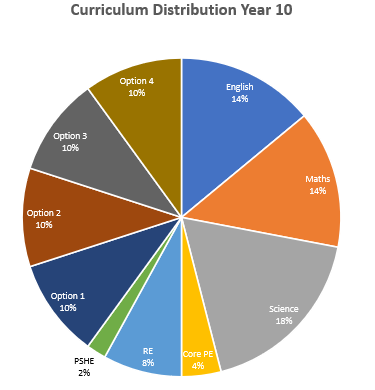
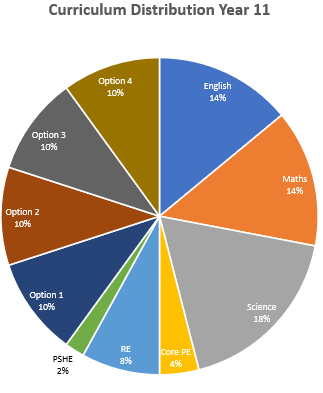

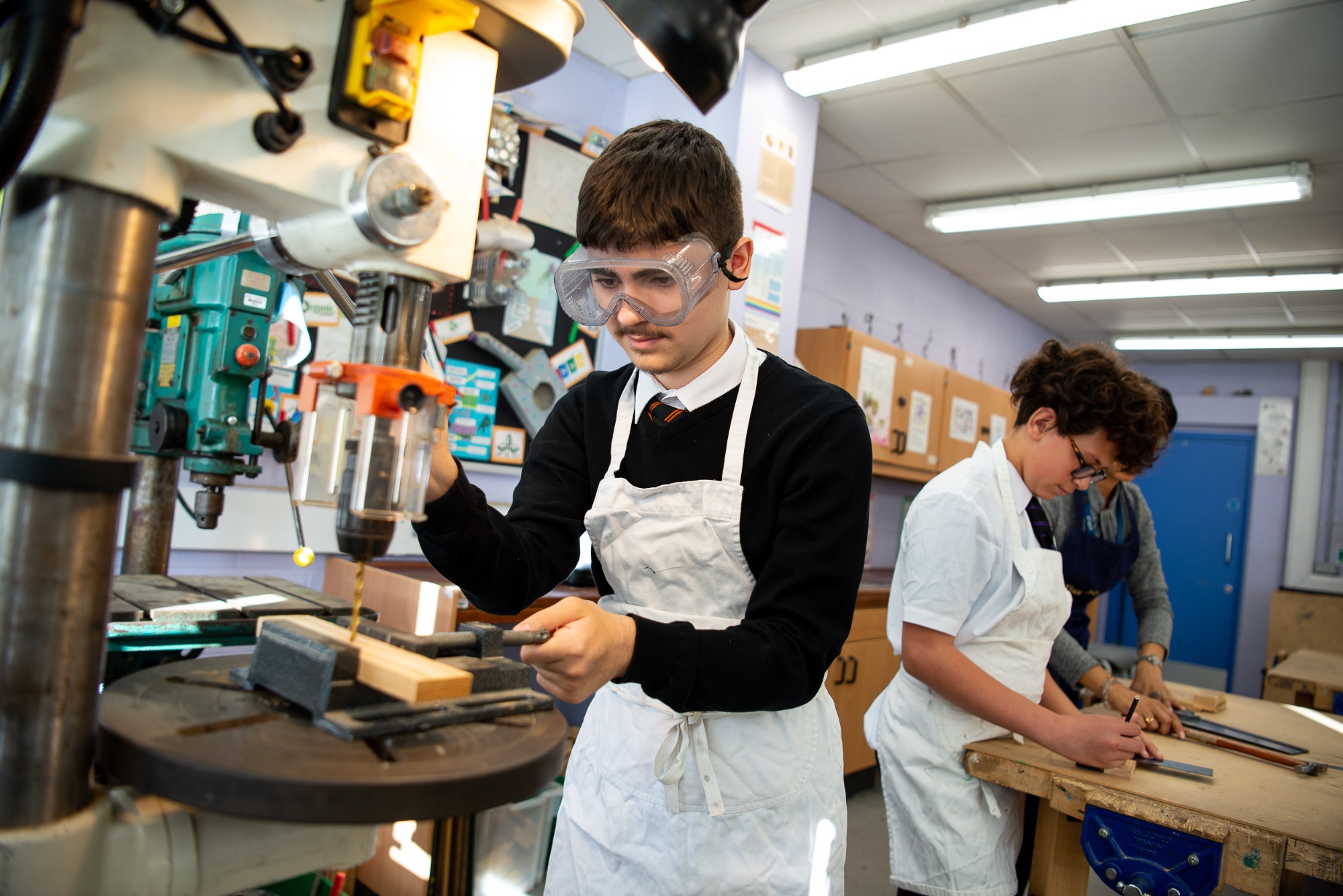
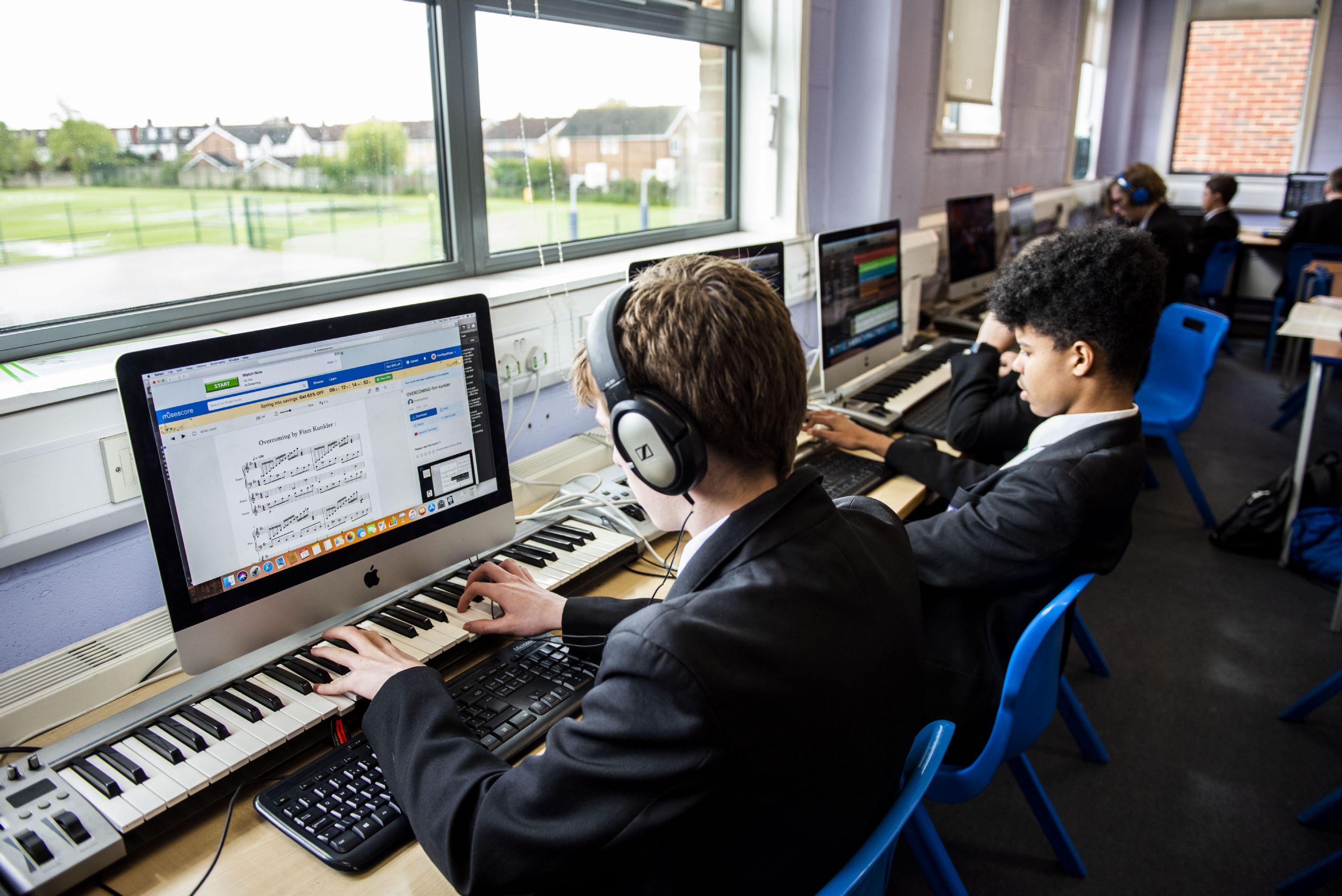
Curriculum Implementation: How We Teach
Heads of Department are the key players in planning the delivery of the curriculum in each subject. The primary focus of their role is to plan sequences of lessons that ensure that students master increasingly complex knowledge and skills, with each year’s learning building upon the last. Working with their department teams, they expertly drive the implementation of their subject by employing and encouraging a wide range of creative approaches and techniques to best secure student learning.
More details and subject curriculum maps are available on our subject pages: Subject information
This starts with the planning of schemes of work and lesson materials and their delivery in the classroom. Their success is then tested using a range of assessment methods. At the same time, leadership at all levels assures the quality of delivery and impact through lesson observation, work scrutiny and student voice interviews. This informs feedback to Heads of Department and subject teachers to inform their planning and help identify training and development needs.
Each Head of Department oversees the preparation of schemes of work for each year group. These support all teachers by setting out the curriculum for their subject with an emphasis on what is to be taught and in what order. When planning a unit, teachers define the key knowledge and skill required in each unit and then plan sequences of lessons to achieve these goals. For example, they will consider the key vocabulary that students need to know. They will plan strategies to help students know and remember more, such as interleaving or retrieval practice. They will make decisions about how often to revisit topics or practice skills.
All teachers ensure their lessons are planned to stretch and challenge the ablest students in their classes as well as supporting those who sometimes struggle. Students who need extra support receive it through a wide range of interventions, including in lessons, during after school catch-up sessions and, where appropriate, via the SEND department.
Assessment is an on-going process and is built into every lesson. Teachers assess student progress in a range of ways, questioning and class discussion, end of unit tests and formal assessments. They carry out detailed question level analysis of students’ work and use this to identify strengths and areas of weakness so that they can intervene appropriately. They mark students’ books in line with our feedback and marking guidance and provide students with the feedback they need in order to improve further.
Every year, students complete formal assessments which are marked and moderated to establish how well each student can recall and apply what they have learnt. Heads of Department analyse these test results against their planned curriculum intents. All of this assessment activity provides valuable information on how well our students are understanding what is being taught and how well our curriculum is being implemented. This informs both short- and medium-term planning because:
- Teachers will adapt their lessons to review points of difficulty and challenge misconceptions
- Heads of Department will review their schemes of work to improve the impact of their curriculum.
Systemic monitoring of teaching and learning by senior and middle leaders also focuses around ensuring the effective planning and delivery of the curriculum. Each subject teacher undergoes two subject focused observations per year which include:
- Observations of every teacher covering a range of year groups across the department.
- A review of the scheme of work in relation to what is being delivered in class.
- A review of the assessment data for each class observed.
- Scrutiny of a range of student work and exercise books.
- Discussions with students about their learning.
- Discussions with teachers about their lessons.
Departments run revision sessions to support academic progress, especially for our main exam years. These sessions are planned and delivered by subject specialists to raise attainment, whilst at the same time, providing students and staff an opportunity for guided intervention.
Across the curriculum, students are given opportunities to reflect on learning and labour market links to units of study. The PSHE curriculum includes schemes of work designed to improve employability skills for students from KS3 to KS5 including work on aspirations, interview techniques and application writing. Our Careers Advisor meets one to one with students completing post-16 applications, and offers guidance on apprenticeships and degree courses for post-18. Year 9 students are given opportunities to attend small group interviews where the Careers Advisor provides support and guidance during the options process and transition to KS4.
To structure the personal development of all Rutlish students, the leadership award scheme identifies opportunities for students to engage with the wider school community. Students are encouraged to participate in activities that include; leading assemblies, being form reps, school council, anti-bullying ambassadors, department ambassadors, and participating in the application and screening process for positions on the Junior Leadership Team.
Please explore our website to find out more:
Curriculum Impact
Each year we review our curriculum as part of a continuous cycle of improvement to maximise its impact. This is done by evaluating, for example:
- Data on student outcomes in internal and national tests
- Analysis of the outcomes for particular groups, for example higher, disadvantaged, SEND.
- Data on student destinations
- Data from monitoring activities such as lesson observations, book scrutiny and student voice interviews
- Subject exam reviews and improvement plans
- Student reading and spelling ages
- The impact of SMSC and wellbeing activities on attendance and behaviour.
For any queries or more detail about our curriculum please contact the Deputy Headteacher by email: rutlish email
